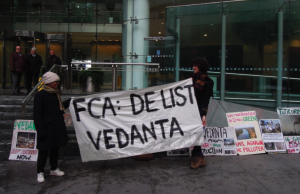 In London today activists from Foil Vedanta and other grassroots groups held a silent symbolic demonstration outside the Financial Services Authority headquarters in Canary Wharf, calling for the new Financial Conduct Authority to de-list Vedanta from the London Stock Exchange for poor corporate governance and human rights crimes in Niyamgiri and elsewhere. They handed over documentation and arranged to meet FCA officials in future.
In London today activists from Foil Vedanta and other grassroots groups held a silent symbolic demonstration outside the Financial Services Authority headquarters in Canary Wharf, calling for the new Financial Conduct Authority to de-list Vedanta from the London Stock Exchange for poor corporate governance and human rights crimes in Niyamgiri and elsewhere. They handed over documentation and arranged to meet FCA officials in future.
Simultaneously the Indian Supreme Court held another hearing on Vedanta’s planned mega-mine which threatens the Dongria Kond tribe who live in the Niyamgiri hills. If permission to mine is denied Vedanta is likely to close its Lanjigarh refinery due to lack of bauxite costing them billions.
See the video of today’s demonstration at the FCA, and also the new video of our previous demonstration at Vedanta Headquarters.
Protesters in London today added their voice to recent pressure for Vedanta to be de-listed from the London Stock Exchange for its poor corporate governance, illegal operations and major human rights violations.(1) Most recently MP John McDonnell raised a debate in the House of Commons calling for the Financial Conduct Authority to use its powers to investigate and de-list companies guilty of major human rights violations such as Vedanta(2). Other parliamentarians, financiers and the former CBI Director Richard Lambert have also highlighted how Vedanta’s listing is used for legal immunity to hide their corporate crimes.(3)
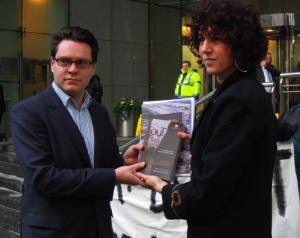
The protesters met with a representative of the FSA (FCA) to deliver key documentation about Vedanta’s chequered ethical record and request a formal investigation into the company. The documents included the Norwegian Ethics Council’s damning report on Vedanta which led them to pull out their substantial shares, and a report by the London Mining Network calling for stricter regulation of nominally London listed mining companies like Vedanta. Lord Adair Turner (head of the Financial Services Authority also graced the demonstration with his presence on his way into the building. They also drew attention to Vedanta’s violations of the UN Declaration on the Rights of Indigenous Peoples at the proposed Niyamgiri mine(4).
The demonstration was almost called off as Security Managers from Canary Wharf Estates claimed that protest was not allowed anywhere on the entire property. Canary Wharf (the central banking district of London) is owned by a private consortium of banks and investors. This means members of the public are technically trespassing if they walk through the area, and any protest can be challenged as ‘aggravated trespass’. Foil Vedanta’s Miriam Rose stated at the demonstration:
“It is outrageous that a public body like the FSA who are supposed to work for the British people, are hiding behind the private property of private corporations and banks where they cannot be held to account by protest.”
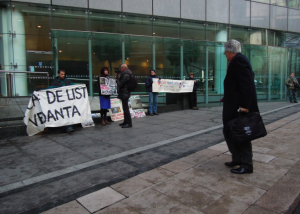
At the last hearing of the Niyamgiri case on 11th January lawyers for Vedanta dwelled on the ongoing demonstrations in London, asking why people are protesting there, and claiming that India is suffering because of this. Judges noted that this is not relevant to the case and pointed out that people have a right to protest. Foil Vedanta’s spokesperson reacted:
“Vedanta is a London listed company and profits from this affiliation. It is typical of Vedanta to assume they are above the law and above public accountability. We will continue to draw attention to their corporate crimes here in London”.
The project has been racked with controversy from the start, as a spate of recent coverage points out: The Lanjigarh refinery built to process the bauxite from the hills was illegally constructed, the court case presided over by a judge with shares in the company, and the refinery should never have been given permission without including the associated mega mine in impact assessments1.
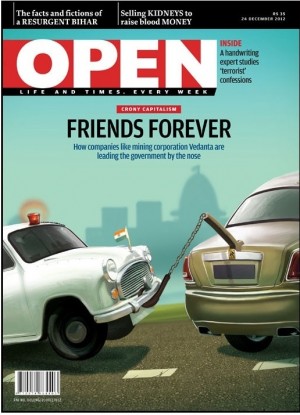
A cover story in major Indian glossy Open Magazine in December details evidence of corruption and collusion between Vedanta and the Odisha state government, local officials, judges and the police to force the project through2. Meanwhile Vedanta’s chairman and 56.7% owner Anil Agarwal has launched a rare PR crusade claiming that Vedanta ‘have not cut one tree’ and respects and preserves the rights of the protesting indigenous tribe living on the threatened mountain. He sets out his extractive philosophy for India – suggesting that exploration should be drastically increased and regulation decreased to provide for the domestic market for metals and oil. 34
If Vedanta lose the Supreme Court case to allow state owned company Orissa Mining Corporation to mine the mountain on their behalf they may have to close the dependent Lanjigarh refinery costing them billions. Under enormous pressure from Vedanta the Odisha government has suggested alternative bauxite supplies from a deposit located in a major wildlife sanctuary and tribal area at Karlapat arousing anger and opposition from grassroots groups.(5)
The final court decision rests on whether the Green Bench of India’s Supreme Court rules the rights of forest dwellers to be ‘inalienable or compensatory’5. In view of this India’s Tribal Affairs Minister V Kishore Chandra Deo has asked the Environment Minister to ensure the rights of forest dwellers is protected in the spirit of the Forest Dwellers act.6 (7)
Speaking about the verdict Dongria Kond activist Lado Sikaka states:
“We will continue our fight even if Vedanta gets permission. Are these Judges above the Law? In effect, they act as if they are. Niyamgiri belongs to us. We are fighting because We are part of it. Our women are harassed and we are called by the police and threatened not to go to rallies. Last month they have been working like Vedanta’s servants.7”
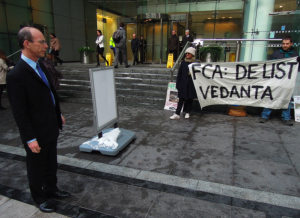 Foil Vedanta’s Samarendra Das says:
Foil Vedanta’s Samarendra Das says:
“Vedanta is not the only mining company that should be de-listed for their corporate crimes. Infamous London listed offenders Lonmin in South Africa, Monterrico in Peru, GCM in Phulbari and Bumi in Indonesia should also be investigated for extensive human rights atrocities.”
Ends.
Coverage:
See the video of today’s protest here.
The Hindu ‘Activists hold protest against Vedanta in London’
Demotix ‘Activists call for FCA to delist Vedanta PLC’
Times of India ‘Green, tribal ministries’ stand on Vedanta case in SC to determine other projects’ fate’
The India Links, ‘Activists hold protest against Vedanta in London’
The demonstration was also covered on Orissa TV and MBCTV in India.
(1) British registered mining company Vedanta have been named the ‘world’s most hated company’ by the Independent newspaper for their long list of environmental and human rights crimes for which they are being opposed all over the world8. Most famously Vedanta’s plan to mine a mountain sacred to the Dongria Kondh tribe in Odisha, India, has led to mass protests and the Church of England among others pulling out investments.
(2) In a parliamentary debate on 28th Nov 2012, MP John McDonnell made the case for Vedanta and other ethically contentious mining companies to be strongly regulated by the Financial Conduct Authority, including possibly de-listed ‘because of their behaviour in the developing world.’9
(3) Vedanta was described in Parliament by Labour MP Lisa Nandy as ‘one of the companies that have been found guilty of gross violations of human rights’ . Ms Nandy in her speech quoted Richard Lambert the former Director General of the CBI: ‘It never occurred to those of us who helped to launch the FTSE 100 index 27 years ago that one day it would be providing a cloak of respectability and lots of passive investors for companies that challenge the canons of corporate governance such as Vedanta…’.10.
Similarly City of London researchers from ‘Trusted Sources’ have noted Vedanta’s
reasons for registering in London:
‘A London listing allows access to an enormous pool of capital. If you are in the FTSE Index, tracker funds have got to own you and others will follow. Both Vedanta Resources and Essar Energy are members of the FTSE 100. London’s reputation as a market with high standards of transparency and corporate governance is another draw for Indian companies. Both Vedanta and Essar have faced criticism on corporate governance grounds in India, and a foreign listing is seen as one way to signal to investors that the company does maintain high standards.’
(4) Please contact us for a statement on Vedanta’s violations of the UN Declaration on the Rights of Indigenous People (UNDRIP) which was endorsed by the UK in 2007. In particular the Niyamgiri project affects the right to water and to free prior informed consent of the local people.
- Please contact us for a 6th Jan 2013 Press Release on this from Lok Shakti Abhiyan and Lohia Academy in Odisha entitled ‘Mining in Karlapat will bring disaster to Nature & Climate’.
(6) The Supreme Court is in the final stages of a court case the challenge posed to the Environment Ministry’s stop to the Niyamgiri mine on 11th January. In its December 6th hearing the Supreme Court concluded that the case rested on whether the rights of the indigenous Dongia Kond’s – who live exclusively on that mountain – could be considered ‘inalienable or compensatory’11.The previous ruling by Environment and Forests minister Jairam Ramesh in August 2010 prevented Vedanta from mining the mountain due to violations of environment and forestry acts. The challenge to this ruling has been mounted by the Orissa Mining Corporation, a state owned company with 24% shares in the joint venture to mine Niyamgiri with Vedanta, begging questions about why a state company is lobbying so hard for a British mining company in whom it has only minority shares in this small project. (see http://infochangeindia.org/environment/features/niyamgiri-a-temporary-reprieve.html)
1‘Games Vedanta Plays’. Economic and Political Weekly.December 22, 2012. http://www.epw.in/editorials/games-vedanta-plays.html
2Mihir Srivastava. ‘How Big Business Gets Its Way: Companies like Vedanta are brazenly taking over governance in some parts of India’. Open Magazine. 22nd Dec 2012. http://www.openthemagazine.com/article/nation/how-big-business-gets-its-way
3Anil Agarwal. ‘Open mining policy can make India an economic powerhouse: Anil Agarwal, Chairman, Vedanta’. Economic Times of India. Dec 17th 2012. http://articles.economictimes.indiatimes.com/2012-12-17/news/35868865_1_bauxite-reserves-resources
4Anil Agarwal interviewed on ‘Walk the talk’. NDTV. January 5th 2012. http://www.ndtv.com/video/player/walk-the-talk/walk-the-talk-with-vedanta-chairman-anil-agarwal/260829
6Urmi A Goswami, ‘Protect the rights of forest dwellers: Tribal affairs minister V Kishore Chandra Deo.’ Economic Times of India. Dec 21, 2012. http://articles.economictimes.indiatimes.com/2012-12-21/news/35953333_1_forest-dwellers-forest-rights-act-vedanta-case
7Excerpt from footage at http://www.youtube.com/watch?v=V3FZX5DrccU&feature=player_embedded